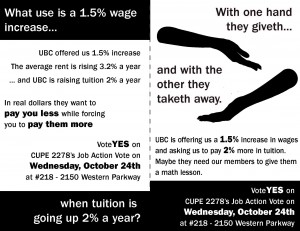Christine Des Garennes, The News-Gazette, February 2, 2014– On one side you have an award-winning, internationally-known scholar. On the other side you have an equally respected researcher and professor with just as many publications and grants to his or her name.
One believes establishing a faculty union would protect and strengthen the university. The other insists a bargaining unit for faculty would weaken the institution.
Can anyone win this debate?
Efforts to form a faculty union on the University of Illinois’ Urbana-Champaign campus in recent years have for the most part entailed discussions in offices and meeting rooms. But as union organizers ramp up their activities — asking people to sign a statement of support (an announcement disclosing numbers is expected soon) and distributing promotional literature — the discourse, if you will, has intensified.
Not long after the Campus Faculty Association, the group behind the unionization effort, delivered to every faculty member a brochure unveiling some of its more prominent supporters, an opposing group ratcheted up its campaign. That group released its own list of notable professors and their reasons for coming out against a faculty union.
Meantime, university officials, including Chancellor Phyllis Wise, have said publicly they don’t see a need for a faculty union and that having one would only make dealings between the faculty and administration more confrontational. And about 140 miles north on the UI’s Chicago campus, the nascent UIC United Faculty is in its 17th month of negotiating with administration for its first contract after organizing back in 2011.
Whatever happens in Urbana, it’s likely the debate will continue for some time.
One union, two contracts
In the U.S., more than 350,000 college and university faculty are represented by collective bargaining units, according to the National Center for the Study of Collective Bargaining in Higher Education and the Professions at Hunter College City University of New York.
Because of a Supreme Court ruling in 1980, which stated that faculty at Yeshiva University acted as managers or supervisors rather than employees, few unionized faculty are found at private institutions, said William Herbert, executive director of the center and former deputy chairman of the New York State Public Employment Relations Board.
The majority of unionized faculty are at public institutions, and about 43 percent are at four-year institutions. In Illinois, there are about 20,062 unionized faculty. Unions are found at state universities like Southern Illinois and community colleges such as Parkland College.
“It’s safe to say that when there is an effort to organize on a campus, it’s democracy in action, and democracy in action takes many different variations,” Herbert said.
Illinois has a public sector collective bargaining statute, which allows employees to unionize. And the process can entail a gathering of what Herbert called “a showing of interest to establish support for unionization.”
“That can lead to voluntary recognition by the employer or, if employer refuses to recognize, then a petition can be filed” with the Illinois Educational Relations Labor Board.
To prove a union has support, organizers can hold an election or a card check in which faculty would sign (or not) cards stating that they favor union representation. If at least 50 percent plus one of all eligible faculty sign authorization cards in favor of forming a union, eventually the union would be able to negotiate a contract.
The Campus Faculty Association has indicated it could go the route of the card check.
“I think it’s going to go much more smoothly here,” compared with the Chicago campus campaign, said CFA President Harriet Murav, UI Professor of Slavic languages and literatures. “This is a campus that has a reputation for excellence. This is the flagship campus … and I don’t think administration would want to impede what we have going on here, in terms of research, teaching and public service excellence. I think the whole country will be watching closely.”
Read More: The News-Gazette

 Follow
Follow